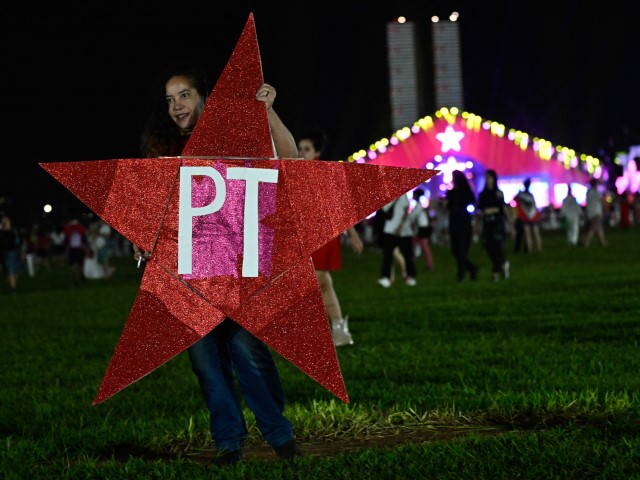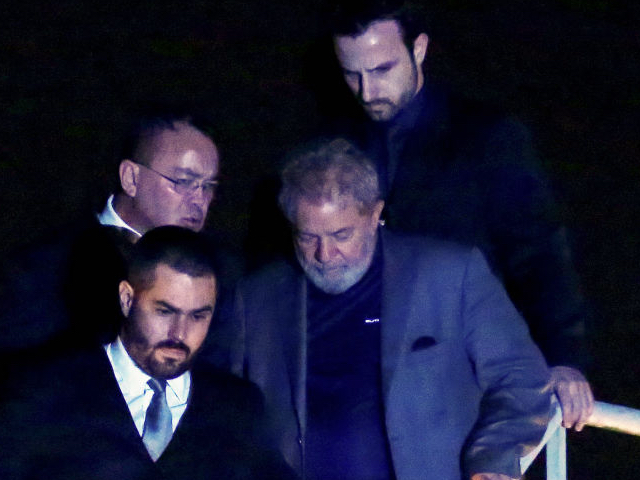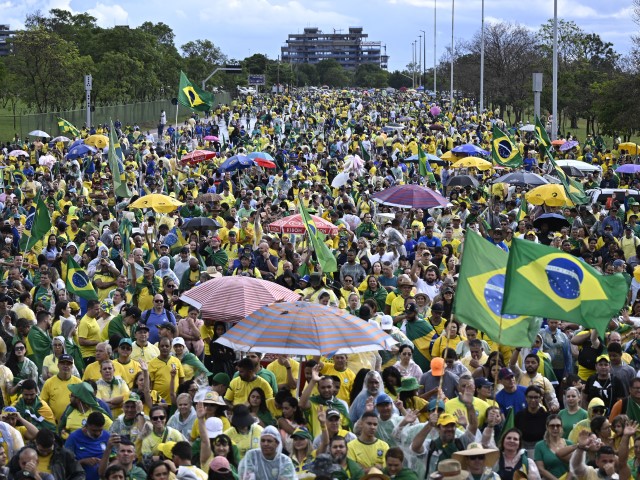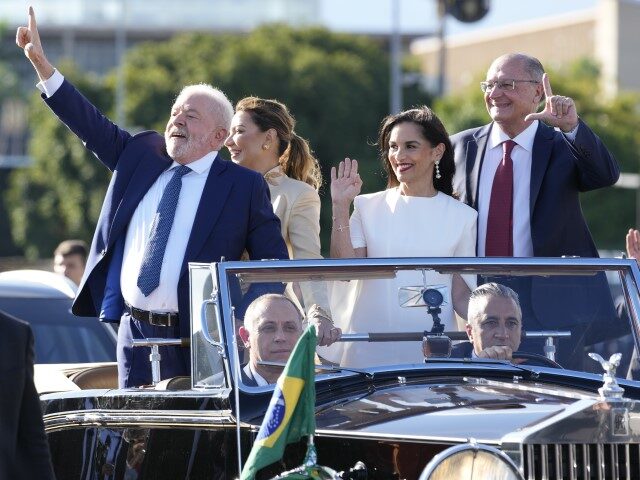Brazil inaugurated hardline socialist Luiz Inácio Lula da Silva into his third term as president on Sunday, cementing a peaceful transfer of power after the convicted felon’s narrow victory over predecessor Jair Bolsonaro in October’s presidential elections.
Following his assumption of the presidency, Lula, as he is popularly known, signed several decrees on Sunday undoing core Bolsonaro policies, most prominently reimposing old gun control provisions and partially restoring the “Bolsa Familia,” a program Lula enacted during his first presidency in 2003 that gives government money to poor families based on eligibility.

A supporter of Brazil’s new president Luiz Inácio Lula da Silva holds the symbol of his party, PT (translated Workers’ Party) as other supporters enjoy the music concert as part of his inauguration ceremony in Brasilia on January 1, 2023. (MAURO PIMENTEL/AFP via Getty Images)
Lula served as president from 2003 to 2011 and was convicted and sentenced, on multiple appeals, in 2019 to over two decades in prison for corruption he allegedly engaged in while president. The nation’s top court overturned his sentence in 2021 on a technicality – claiming the original court that tried the case did not have jurisdiction to do so – and allowed him to run against Bolsonaro. In addition to corruption, the “Bolsa Familia,” which greatly expanded wealth redistribution to the poor nationwide, was his signature policy achievement. Lula also secured Brazil’s hosting duties for the 2014 FIFA World Cup and the 2016 Rio de Janeiro Summer Olympics, which resulted in billions in government spending and prompted widespread protests.

Brazilian ex-president (2003-2011) Luiz Inácio Lula da Silva arrives at the Federal Police headquarters where he is due to serve his 12-year prison sentence, in Curitiba, Parana State, Brazil, on April 7, 2018. (HEULER ANDREY/AFP via Getty Images)
Lula cried during his inaugural speech on Sunday, claiming that Brazil had suffered a catastrophic rise in poverty and hunger during the Bolsonaro administration.
“For a long time, we had not seen such abandonment and discouragement in the streets – mothers digging through garbage in search of food for their children, entire families sleeping in the open air, facing cold, rain, and fear,” Lula claimed. “Children selling sweets or begging, when they should be in school living the childhoods they have a right to fully.”
Speaking later that day to the Brazilian Congress, Lula’s tone changed, focusing instead on vitriol towards the Bolsonaro administration.
“Democracy was the great victor in this election, surpassing the greatest mobilization of public and private resources ever seen; the most violent threats to the freedom to vote,” Lula claimed, “the most abject campaign of lies and hate plotted to manipulate and embarrass the electorate.”
Lula did not name any particular example of “violent threats to the freedom to vote” or any particular lies hurled in his direction. During the 2022 campaign, Lula’s campaign spread rumors that Bolsonaro was a cannibal and Lula himself accused Bolsonaro of being a “pedophile,” neither accusation backed by any credible evidence.
“Never before have state resources been so misused for the benefit of an authoritarian project of power,” the convicted felon continued. “Never has the public machine been so far removed from republican controls. Voters have never been so constrained by economic power and lies disseminated on an industrial scale.”
Lula took a moment to also thank the TSE for its intervention to his benefit, claiming its silencing of discussions regarding his corruption conviction “was essential to make the truth of the polls prevail over the violence of its detractors.”
Brazil allows its president to act in the office immediately following the inauguration, and Lula did so, signing several decrees and “provisional measures” that may await Congressional approval. One of the decrees signed, according to the Brazilian news network Jovem Pan, was a measure guaranteeing “Bolsa Familia” payments of 600 reais ($112.46) to eligible citizens. Outside of this measure and a freeze on fuel taxes, however, Lula did not appear to prioritize alleged aid to the poor, instead signing decrees to undo classification of information made during the Bolsonaro administration and attempting to undo some of Bolsonaro’s gun rights measures. Bolsonaro had prioritized extending the gun rights of law-abiding Brazilians during his presidency. On Sunday, Lula signed a measure freezing the issuing of any further firearms permits to hunters, recreational shooters, or collectors.
Lula’s return to power after presiding over one of the most corrupt administrations in Brazilian history – and being sentenced to over two decades in prison for it – was a shock to the Brazilian political system, causing significant civil unrest for much of the end of the year. After multiple appeals and years of legal battles, Lula was sentenced to about 25 years in prison total in 2019 for using bribe money to buy a luxury beachfront property while president. The acts of corruption he was accused of were part of a much larger scheme now known as “Operation Car Wash,” the name of the police investigation that it triggered, which has resulted in dozens of politicians of nearly every political party in the country going to prison. Public outrage against the corruption uncovered in Operation Car Wash was largely responsible for catapulting Jair Bolsonaro, a self-identified conservative who presided over a largely pro-communist China administration, into the presidency in 2018.
Brazil’s Supreme Federal Tribunal (STF), its top court, overturned Lula’s convictions on a jurisdictional technicality and never presented any evidence exonerating Lula of the crimes in question. The STF’s electoral authority offshoot, the Superior Electoral Tribunal (TSE), also barred journalists and Bolsonaro supporters from most discussions of Lula’s convictions, including a ban on calling Lula “corrupt,” subject to fines.
The significant censorship and lack of evidence exculpating Lula prompted many conservatives to protest his victory in October. Pro-Bolsonaro truckers, in particular, organized roadblocks and other protests demanding the military intervene to prevent a president they deemed illegitimate from taking office. The protests were exacerbated by Bolsonaro refusing to make public statements for much of the first week following the election, which many took as a sign of his approval. Bolsonaro ultimately published a video online discouraging illegal activities and roadblocks but did not publicly congratulate or acknowledge Lula’s victory in a direct way.

Supporters of Brazilian President Jair Bolsonaro take part in a demonstration against the results of the runoff election, in front of the Army headquarters in Brasilia, Brazil, on November 15, 2022. Many Brazilians convened in front of army headquarters in Rio de Janeiro, Brasilia, and other cities, demanding the military intervene to prevent leftist president-elect Luiz Inacio Lula da Silva taking power next year. (Mateus Bonomi/Anadolu Agency via Getty Images)
Bolsonaro did not attend Lula’s inauguration on Sunday. Traditionally, past presidents attend the Brazilian presidential inauguration to hand over the presidential sash, a revered political artifact. Some reports this weekend indicated that Bolsonaro had traveled to Florida; a journalist for Brazil’s TV Globo published an image on Saturday of a man, allegedly Bolsonaro, dining at a Florida KFC.

COMMENTS
Please let us know if you're having issues with commenting.